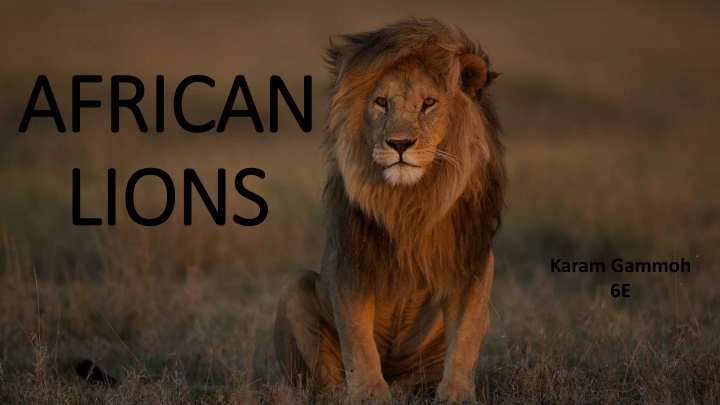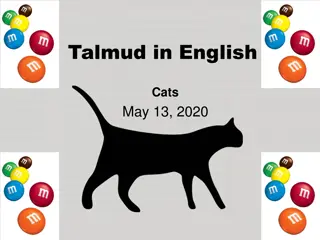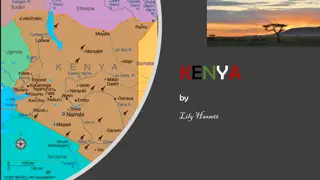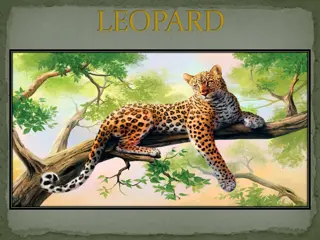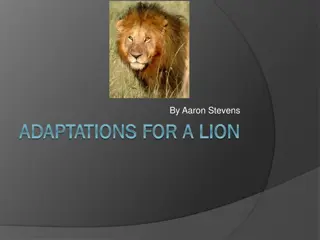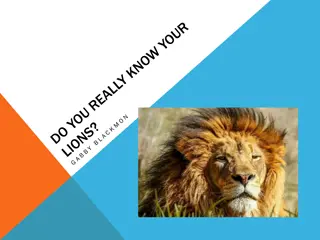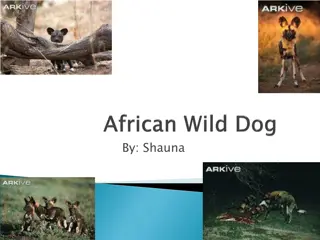African Lions - The Majestic Big Cats in Danger
African lions, the popular big cats known for living in prides, are facing extinction due to hunting, habitat loss, and climate change. With just 23,000 remaining in the wild, urgent conservation efforts are crucial to protect these iconic species. Non-profit organizations like African Parks are working to safeguard lions through various interventions, including park protection and monitoring. Collaborative efforts are needed to ensure the survival of African lions for future generations.
Download Presentation

Please find below an Image/Link to download the presentation.
The content on the website is provided AS IS for your information and personal use only. It may not be sold, licensed, or shared on other websites without obtaining consent from the author.If you encounter any issues during the download, it is possible that the publisher has removed the file from their server.
You are allowed to download the files provided on this website for personal or commercial use, subject to the condition that they are used lawfully. All files are the property of their respective owners.
The content on the website is provided AS IS for your information and personal use only. It may not be sold, licensed, or shared on other websites without obtaining consent from the author.
E N D
Presentation Transcript
AFRICAN AFRICAN LIONS LIONS Karam Gammoh 6E
African Lions are the most popular specie of big cats. They are the only big cats that live in large family prides consisting of four to 12 related adult females with their offspring plus two to three unrelated adult males. Lions also hunt in groups using stalking and ambush techniques. Females do most of the members of the pride share in the kill, with males eating first followed by females and then cubs. Males protect the females and cubs from other lions and hyenas. groups called hunting. All Lions are an apex predator and, like all apex predators, play a crucial role in maintaining a healthy herbivore population and balanced ecosystem.
Habitat African lions are typically found in savannas, plains, grasslands, dense bush and open woodlands where prey is abundant. They can also be found in smaller numbers in semidesert and habitats This species can be found in most countries of sub-Saharan Africa, primarily eastern and southern Africa up to elevations of 13,700 ft. (4,200 m). mountain inhabiting
Statistics Lion numbers have been decimated, estimated 23,000 remaining today, down from 450,000 in the past 50 years. with an like many of Africa s iconic species, lion populations are also shrinking rapidly and are expected to suffer an additional 50% decline in the next 2 decades.
Reasons behind Extinction The main threats to African lions are hunting conflict and natural prey decline ( Death) as well as habitat loss, climate change and wildlife trade. With around 23,000 African lions left in the wild, they're now officially classified as 'vulnerable'. Unfortunately, lion hunting is legal in Africa. But at the same time, the government of Botswana, Namibia, and Zimbabwe are the top countries that allowed the people to hunt wild animals. South Africa,
Whatis being done now to preserve African Lions Non-profit conservation organizations such as African Parks takes on direct responsibility for the rehabilitation and long-term management of protected areas in partnership with governments and local communities. In African countries like Kenya, lions are largely restricted to protected areas and surrounding community conservation areas, where hunting is prohibited. African Parks has heeded the call to safeguard and protect Africa's largest and most iconic cat through effective park protection at a landscape level, and species-specific interventions including reintroductions and translocations, monitoring and research and mitigating human-lion conflict. With the continental population decreasing and threats continuing to mount, it s become more important than ever to closely track this species. In Tanzania s Manyara Ranch, National and International Organizations tagged the lions with high-tech collars equipped with radio transmitters to track the animals natural movements. This allows scientists and conservationists to monitor for potential disease outbreaks, home range, productivity, behavior, habitat use, survival, predator-prey interactions, and ultimately population estimates.
Thank Thank you you
